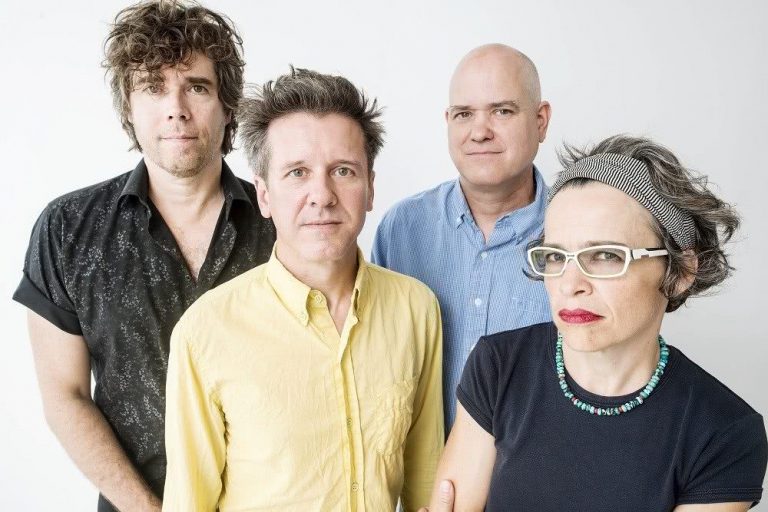It hasn’t been easy to get Mac McCaughan on the phone. Between fronting his veteran indie rock band, Superchunk, and his daily role at Merge Records, the label he co-founded decades ago with bandmate Laura Ballance, McCaughan is flat out right now. But he’s beaming nonetheless, having just come off the first clutch of dates for Superchunk’s fiery, of-the-moment new album, What A Time to Be Alive.
“I tend to think the internet ruins everything,” he quips, half-joking, “[but] if you stream the album a week before it comes out, people know the songs right away.” That leads to more satisfying gigs for the band, which includes guitarist Jim Wilbur, bassist Ballance and drummer Jon Wurster – though these days Jason Narducy tours in place of Ballance. The band, who last played Australia in 2013 and would love to come back again soon, are famously high-energy live.
But it’s not just an advance stream that’s burnt these songs into fans’ brains. What A Time to Be Alive is one of the catchiest, most direct and more memorable records in a career that’s been defined by those qualities. Formed in 1989 in Chapel Hill, North Carolina – a vibrant Southern college town that they’ve helped to enshrine as an indie mecca – Superchunk put out raw and punky classics like No Pocky For Kitty and On The Mouth through Matador before releasing 1994’s watershed Foolish themselves via Merge. After eight strong LPs, they sat out most of the ’00s before returning with 2010’s invigorated Majesty Shredding.
The energy of the songs as they were written lent themselves to short, fast song structures.
Galvanised by Trump’s election win, McCaughan wrote most of the new songs between November 2016 and February 2017. He and the band render them with buzzing immediacy, right from the sugar-high hook that opens the album. Driven by acidic commentary and lean forward motion, just one of the songs cracks the four-minute mark, and the hardcore-slanted ‘Cloud Of Hate’ ends after a blurted 74 seconds.
“The energy of the songs as they were written lent themselves to short, fast song structures,” confirms McCaughan, who says a new Superchunk record wasn’t even in the cards until these songs came pouring out. “[But] once I had the songs written – and they were written pretty quickly – it made sense not to sit on it. Like, let’s get this out while it’s fresh.”
While he concedes that the album doesn’t vary as much as usual in terms of tempo and texture, “this just felt right to be a loud-guitars-and-short-songs kind of record.” It’s the first Superchunk LP in more than 20 years without keyboards and, unlike the past couple records, McCaughan didn’t take the studio recordings home to flesh out with overdubs. Reuniting with engineer Beau Sorenson, who worked on 2013’s I Hate Music, the band did tap backing vocalists like Stephen Merritt (The Magnetic Fields), Katie Crutchfield (Waxahatchee) and David Bazan (Pedro the Lion).
For McCaughan, who also has a long-running solo outlet in Portastatic and released the 2015 album Non-Believers under his own name, it was clear where these new songs would land. “They were so guitar-focused,” he recalls, “and had the energy of a Superchunk record. One of the luxuries about being in a band for this long is that it’s easy for me to imagine what a song is going to sound like with Superchunk playing it.”
But does that muscle memory sometimes make it hard not to repeat yourself? “Our guard is always up for something that sounds rote,” says McCaughan. “And it always has been, which is why we’ve chosen to make records with [producer] Jim O’Rourke or records that were more keyboard-heavy, like [2001’s] Here’s To Shutting Up. So we always try to make things different, just for our own interest and so we don’t make the same record over and over again. At the same time, I think that stepping away for a few years allowed us to see what our strengths are. It allowed us to embrace them without repeating ourselves.”
Except for album closer ‘Black Thread’, which starts more slowly with acoustic guitar, much of What a Time To Be Alive harks back to Superchunk’s punchy, unpolished early years. “Since the beginning,” explains McCaughan, “we’ve recognised what’s been influencing us. Bands like the Buzzcocks and Hüsker Dü that combine this punky energy and really good songs, as well as a wider range of stuff like the Flying Nun catalogue. That really hasn’t changed – it’s just that obviously as people you change, and as a band you hopefully get better and learn how to do different things, while naturally incorporating those influences.”
Sometimes saying ‘fuck you’ is just what you need to say.
Songs like ‘Lost My Brain’ and ‘Reagan Youth’ are especially pointed, rivalling 1990’s defining anthem ‘Slack Motherfucker’ for sheer angst-ridden catharsis. “I was definitely aware that lyrics that are too on-the-nose are boring,” he says. “Or preaching to the choir. It’s not something that’s very interesting to listen to. I think the key is that there’s a personal angle on it that differentiates it from more pedantic or just obvious takes on something.” Cue a subtler song like ‘Dead Photographers’, which tackles both mortality and the consumption of art.
For Superchunk, who long ago honed their eruptive, mouthy indie rock to a razor-sharp edge, there’s always a balance between ire and articulation. “There are moments,” admits McCaughan, “when you can find humour in saying something in the most plain way. Sometimes saying ‘fuck you’ is just what you need to say. But you can’t say it all the time, because that would be boring.”
What A Time To Be Alive is out now through Merge/Rocket.


































